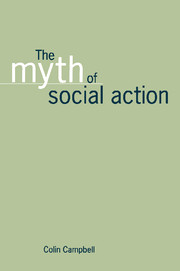Book contents
- Frontmatter
- Contents
- 1 Introduction
- 2 Action reported missing in action theory
- 3 Action and social action
- 4 Action versus social action
- 5 The rise of social situationalism
- 6 The argument by denial
- 7 Accounts and actions
- 8 The argument by exclusion
- 9 The argument through incorporation
- 10 The ‘learning everything from others’ thesis
- 11 The communicative act paradigm
- 12 The linguistic turn for the worse
- 13 The myth of social action
- 14 The obstacle which is social situationalism
- 15 Epilogue: bringing action back in
- Notes
- Bibliography
- Index
10 - The ‘learning everything from others’ thesis
Published online by Cambridge University Press: 07 May 2010
- Frontmatter
- Contents
- 1 Introduction
- 2 Action reported missing in action theory
- 3 Action and social action
- 4 Action versus social action
- 5 The rise of social situationalism
- 6 The argument by denial
- 7 Accounts and actions
- 8 The argument by exclusion
- 9 The argument through incorporation
- 10 The ‘learning everything from others’ thesis
- 11 The communicative act paradigm
- 12 The linguistic turn for the worse
- 13 The myth of social action
- 14 The obstacle which is social situationalism
- 15 Epilogue: bringing action back in
- Notes
- Bibliography
- Index
Summary
One of the key arguments advanced by situationalists stresses how the meaning which informs the actions of individuals either derives from knowledge which is ‘learnt from’ or ‘acquired via interaction with’ other people, or alternatively constructed employing abilities which have themselves been acquired in this way. A claim which is seen as sufficient grounds for declaring such understandings and therefore any associated action to be ‘social’ in character. This assumption has become so widespread and taken-for-granted by situationalists that it is routinely made en passant in discussions without any attempt to justify it. Thus in the passage from Totman quoted above he states that the gardener's knowledge is ‘passed through the community’, when in reality much of it could have been acquired from books or through experience. There are several different versions of this argument depending on what exactly it is presumed that individuals learn from others in this way. At one extreme all that is stressed is denotative meaning or simply the names for people, objects and events, whilst at the other it is the whole body of discursive and non-discursive knowledge which it is assumed is transmitted in this fashion. One commonly encounters the view that everything necessary for the individual to engage in successful action in the world is effectively ‘socially derived’ and ‘language carried’, which is to say it is acquired from others. In so far as the argument stresses the acquisition of general abilities rather than knowledge itself, then those most commonly identified tend to be the possession of a self and hence the ability to be reflexive, as well, of course, as the ability to use language.
- Type
- Chapter
- Information
- The Myth of Social Action , pp. 104 - 114Publisher: Cambridge University PressPrint publication year: 1996



